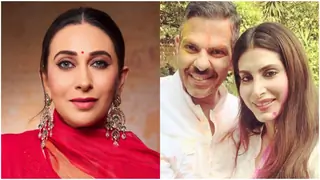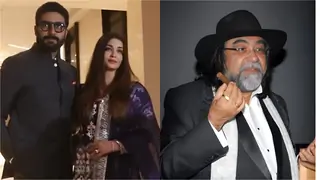As I was thinking about the iminent shift to Ishwari Nivas, and the week at Bose house that has just passed, I had an epiphany about the purpose of the leap. In S1, one of my biggest discomforts was the fact that no character on the show really seemed to question the patriarchal system. Even the most progressive voices on the show, Asha and Bijoy, simply accepted the fact that a daughter would one day have to leave her parents' house and live with her husband's family. Dev and Sona both claimed to want an equal marriage, but didn't really examine how Sona coming to live in Dev's house enforced inequality on their relationship by placing Sona at a disadvantage.
Soha and the leap form an excellent plot device through which Sona uses her biological privilege as a woman (as in, she carries the baby) to challenge Dev's social privilege as a man.
We have collectively identified Sona's weakness in her and Dev's marriage as the desire to achieve an executive position in the Dixit family immediately. I still maintain this view, but it begs the question of why Sona had to earn that place at all. She had an executive position in the Bose household, which she had rightfully earned. If she had to earn her place in the Dixit family, starting from scratch, it all came down to the fact that she was a woman who accepted a system that was disadvantaged her, based on her gender. It doesn't matter how welcoming or loving the groom's family is (that is a separate concern), a woman still has to put in extra work to adapt to a new family while the same is not expected of men in the system.
What is interesting to me is that the show is still not questioning this directly. Even after everything that happened, Sona still believes in raising her child in a joint family and Ronita is still moving in with the Boses after she gets married. However, the writers are bringing these questions to the fore now through Soha. Sona's biological advantage as the parent who carried Soha allows her to be secure in her place as Soha's parent in a way that Dev can't be. This advantage is exacerbated by the fact that Sona had the freedom not to make Dev part of their lives for six long years, and she could have easily continued in that vein had Dev not intervened of his own accord. By introducing this plot element, the CVs are forcing Dev to earn his place as Soha's father the same way Sona had to earn her place as a Dixit -- neither was fair and both stemmed from one partner failing to check their privilege.
Dev never thought about the fact that he wanted Sona, as an independent woman, to live in a house that was under someone else's name. With people like GKB and even Ishwari, money talks. It would have changed the equation completely if Sona and Dev mutually created a home for themselves and invited Ishwari to live there with them but that was not the case at Ishwari Nivas. To GKB and Ishwari's eyes, Sona lived under Dev's largesse just like them and it was therefore fair game to engage her in competition over Dev's wealth. Dev loved Sona's independence but he didn't really think through how this arrangement -- which he expected her to comply with even now -- would take a toll on the way she viewed herself.
Sona was equally responsible for not questioning the terms of their living arrangement before or during their marriage. That is what Soha, and Sona's exaggerated biological advantage have changed. Similar to Dev's home, over which Sona had no legal claim, Dev has no legal claim over Soha. Sona willingly entered a system that disadvantaged her in order to be with Dev in the only meaningful way she perceived -- marriage. Dev didn't question Sona's biological advantage because doing so could prevent him from being with Soha; he unquestioningly accepted the disadvantage of his position. But if we are to have an equal society, don't both of these inequalities need to be questioned? That is what I think this week at Bose house, and Sona's idea for this arrangement, kick started.
Sona's exercise of her biological privilege was a direct result of Dev exercising his social privilege, and story-wise, the latter had to be dealt with first. Dev's sojourn in the Bose house was all about dismantling male privilege, not just for Dev but for all the men in the household. Now that Dev had a chance to observe the Boses closely, their camaraderie and their solidarity, he has a window into why Sona couldn't approach relationships in the Dixit family with the cool detachment he had hoped to see from her. Sona may be independent and strong financially and professionally (which is the avatar he fell in love with), but she is heavily dependent emotionally on the validation and warmth of her loved ones. Similarly, Bijoy was forced, for the first time, to think of himself as others saw him, not just as he saw himself. This genuine questioning forced him to see Asha, Sona, and even Dev in a new light.
Even Saurabh and Jatin were forced to contend with new and complex situations. Saurabh reacted impulsively to Dev's alleged stealing and threatened to leave his home if Dev stayed there. He was brought back down to earth by Ronita, who followed him relentlessly until he agreed to listen to her. Jatin also had a fight of flight response to Dev's aggression; not wanting to fight him, he decided to run away from the complexity of the situation until Asha advised him to stick it out. Even Vicky began to feel the pangs of envy when he saw his son's relationship with Dev. Ever since the beginning of the show, men have been shown to see things in black and white while women see the greys. In this phase, the men were finally dragged into the grey area. Bijoy, Saurabh, and Jatin were each pitted against Dev as rivals, only to come to the realisation that it was so much more complicated than that; in none of their respective situations did it have to be either or. Neither does it have to be for Vicky.
In short, this week at the Bose house dealt with male privilege and Dev questioning his social advantages. I believe that the week at Ishwari Nivas will focus on Sona and the question of biological privilege. Apt, considering Ishwari's constant refrain: only a mother can understand a mother.
Disclaimer: This is a meta-analysis. I am NOT trying to say Sona is getting back at Dev through Soha, so please don't even go there. I am commenting on the clever dynamics of the storytelling, where they are using the leap and Soha to address some embedded beliefs in a very subtle manner.



































